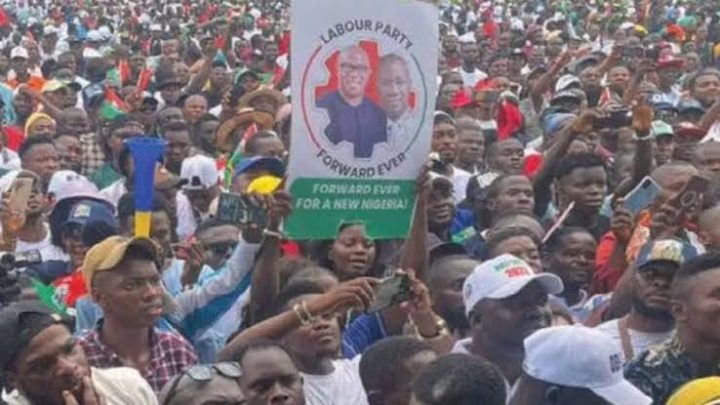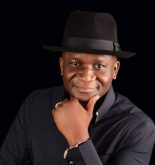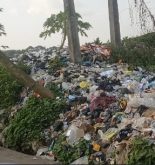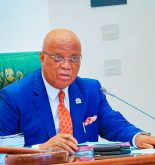The Obidient Movement, which largely emerged from the ashes of #EndSARS, is fundamentally altering Nigeria’s political landscape in more ways than any other group or demographic since the nation’s independence.
When the Police Went on a Homicidal Blitz
The date was May 4, 2020, and the location was Awka, the capital of Anambra State in Nigeria’s south-east region.
Inside a beer parlour, a Nigerian Police officer opened fire on a 27-year-old final year Law student of Nnamdi Azikiwe University.
A similar incident occurred on May 21, 2020, in Nimo community, Njikoka Local Government Area in the same state.
At around 8 p.m., an apprentice barber, the only son of his parents, was returning from work when he was pursued by operatives from Nimo Police Station until he collided with a moving vehicle and died. The boy was from Adagbe Avomimi village in Njikoka LGA.
Tina Ezekwe, a 17-year-old girl, was reading for her high school certificate examination on May 26, 2020, when she was hit by a stray bullet fired by a drunk police officer.
According to witnesses, the officer was enraged by a bus driver’s refusal to pay a bribe and fired into the air to disperse people who had gathered after he opened fire on the bus. She died two days later, sparking a social media outrage and demand for justice.
Again, a policeman killed a 20-year-old commercial motorcyclist on June 2, 2020, in Adamawa State, North-East Nigeria, for refusing to pay a N100 bribe. A week later, on July 9, 2020, a policeman killed a 27-year-old man in Imo State, South-East Nigeria, for failing to wear a face mask.
Samson John was fatally shot by a police officer on October 3, 2020, inside an Abuja beer bar. A week later, in Lagos, South-west Nigeria, a young woman was shot in the mouth for protesting an earlier murder by the notorious Special Anti-Robbery Squad, also called SARS.
At this point, the public, particularly young Nigerians, had had enough and would not stand by and watch the homicidal rampage continue. People from all walks of life and every part of the country started speaking up and demanding justice.
Endless Complaints Turned to Protests
As more and more young people shared their experiences and denounced those who assaulted them or their friends, the movement to stop the killing of youths by murderous gangs operating under the rogue SARS erupted on Facebook and Twitter.
SARS began as an elite unit of the Nigerian Police designed to combat daredevil armed robbers terrorising citizens across the country.
Instead of following their rules of engagement, the officers devised methods and means to extort people, particularly young people. A young person with full beards or dreadlocks was more likely to be arrested and held without charge for several months.
To secure their release, the suspects’ parents and relatives were forced to pay a large sum in bail, which the Nigerian Police constantly claim is free. Many were tortured for days before being executed because their relatives could not afford the astronomical bail amount.
Being arrested by SARS suddenly became a death sentence and Nigerians, both the young and the old, dreaded the notorious police unit like a plague. Almost every family in the country has had an experience with SARS.
Nigerians, however, said they had had enough by mid-October 2020, and poured into the streets in rage to force the government to act.
The protesters made five demands: Immediate release of all arrested protesters; justice for all deceased victims of police brutality; establishment of an independent body to investigate police misconduct; psychological evaluation of SARS operatives prior to redeployment; and salary increases for police.
Everywhere, from Abuja to Lagos, Uyo to Anambra, young people and even the elderly mobilised and took up positions on the streets while shouting at the top of their lungs in the hope that the Nigerian government would take notice of them.
Protesters marched through Abuja’s major roads and gathered in front of the Louis Edet House (Force Headquarters), demanding that the then-Inspector General of Police, Muhammed Adamu, address them.
While singing and dancing, they distributed snacks and drinks to everyone, including the police and passers-by, and then went around collecting and disposing of all the dirt.
As the police were eating and drinking with the protesters, they rolled out water cannons and a detachment of anti-riot operatives, and, without provocation, attacked not only unarmed protesters, but also journalists and activists.
The Force Headquarters’ crackdown on October 10, 2020, unleashed a wave of additional assaults on the young protesters, who had only wished to be shielded from the SARS-branded rogue police officers.
The next day, protesters were manhandled at the Abuja Unity Fountain, using live ammunition and tear gas.
Narrating what happened, Raphael Adebayo, co-convener of the Centre for Liberty, had said, “Fellow Nigerians, we have just been tear-gassed. I can’t see well now. My glasses are damaged. Someone got shot in the back of the head.”
The government attempted to engage the movement’s leadership while also beating them across the nation, but sadly there was no central command structure.
Massacre in Lekki
On October 20, 2020, the unthinkable happened when troops massacred unarmed protesters waving the country’s flag and singing the national anthem at the Lekki Tollgate in the commercial city of Lagos.
Scores were killed and maimed, and troops were accused of taking away corpses of the young people they mowed down at the tollgate.
The government was only able to stop the protests when it deployed brutal force against the youth, unleashed hoodlums on them, and chased some of the movement’s leaders into exile.
However, in a self-serving move, President Mohammadu Buhari signed an Executive Order prohibiting SARS and directing the formation of judicial panels in all 36 states of the Federation.
While the panels’ reports only scratched the surface of the issues that precipitated the crisis, one thing stood out.
The panels agreed that there was indeed abuse and outright criminality on the part of the notorious SARS operatives and the soldiers who were deployed to the Lekki tollgate.
Particularly, the Judicial Panel of Inquiry and Restitution at the Lagos Court of Arbitration gave a damning verdict against the military.
In a bombshell report – which took more than a year to produce – the panel accused the Nigerian Army officers of having “shot, injured and killed unarmed helpless and defenseless protesters, without provocation or justification, while they were waving the Nigerian Flag and singing the national anthem and the manner of assault and killing could in context be described as a massacre.”
Apart from violating its Rules of Engagement, the Panel also said that “the conduct of the Nigerian Army was exacerbated by its refusal to allow ambulances render medical assistance to victims who required such assistance.”
Despite overwhelming evidence, the Nigerian government has continued to deny that protesters were shot. On the one-year anniversary of the shooting, the Minister of Information, Lai Mohammed, described the incident as a “phantom massacre” and continued to dismiss reports of the killings as fake news.
The Rise of the Obidient Movement
The government and political elite who were afraid that the EndSARS protest would snowball into a full-fledged revolution may have exhaled after the streets were cleared.
But that was a mistake because a seed of defiance had been planted, and many Nigerians were waiting for the right moment to exact a pound of flesh from the evil system.
Another blunder made by the political establishment was the assumption that because the protest was organised by young people, it lacked widespread support.
No one can truthfully say that the EndSARS Movement has not contributed to blossoming political consciousness among young Nigerians.
One of the leaders of the Movement, David Hundeyin, insists that the burgeoning movement largely driven by young Nigerians who are in support of the Labour Party Presidential Candidate, Peter Obi, is not a direct successor of the EndSARS Movement.
Mr. Obi had resigned from the main opposition PDP, shortly before its national convention where he sought the party’s presidential ticket on the grounds that the process was highly corrupt and monitised.
The former governor of Anambra State in Nigeria’s South-east is being considered by many as the most competent, most credible and fitting candidate in the race and has enjoyed massive followership and endorsements by prominent persons Nigerians in a campaign he has rallied Nigerians to take back their country.
“Certainly, not everyone who was a part of the #EndSARS protest has become a part of the Obidient Movement. In fact, the splintering of several high-profile participants in the 2020 protests across the three major political formations competing in the election has been very well documented.
The key detail that both movements share in common, however, is their total decentralization and absence of any kind of conventional leadership. Such a phenomenon – heavily influenced as it was by internet culture and near-universal cheap, high-speed internet access across urban Nigeria – was never observed in Nigerian political culture until #EndSARS.
Mr. Hundeyin, who is a strong voice in the Obidient Movement said though #EndSARS did not birth the pro-Peter Obi political movement – it did something far more fundamental, with greater future implications for Nigeria’s political space.
By avoiding the centralization pitfall that derailed prior protests movements in the past, he argued that #EndSARS inadvertently created a whole new political action paradigm for young Nigerians that placed shared demands and collective agenda front and centre of discussion instead of individuals.
Another #EndSARS leader, Rinu Oduala, who is also a prominent Obidient (supporter of Mr. Obi) argues that #EndSARS should not be lumped together with any political movement.
“The fact that many supporters of the movement joined doesn’t morph the other movement they are involved. There are distinctions between the EndSARS Movement and any recent political movement going on now,” Miss Oduala said.
Activist, and Co-Convener, Centre for Liberty, Raphael Adebayo, who was also a key figure in the #EndSARS Movement said there is a likelihood that the current wave of support that the Obedient Movement is ridding on stemmed from the 2020 protests by the Nigerian youth.
“#EndSARS influenced the current wave of support that the Obidient movement is riding on, especially considering how public disenchantment worsened after the #EndSARS protests were violently suppressed in 2020.
“However, the Obidient Movement and the #EndSARS Movement represent different ideals. #EndSARS has always been about ending police brutality and achieving institutional reforms in the Nigerian Police Force.
“But the Obidient movement is, first and foremost, about political power. Popular support for a political party or candidate during electioneering is as transient as the process it validates. As a result, the definitive indices for predicting the future of Nigeria’s electoral process will only come alive after the elections are over and the winner assumes office.
“These indices will also be affected by two outcomes: One, if the election is free and fair; two, if the winner performs well in office as Nigeria’s president. From what we know about Nigeria’s electorates, electoral outcomes and the performance of elected officials directly impact voter participation in the electoral process,” said Mr. Adebayo.
He argued that voter participation is only one part of the equation; the other part being the lingering question of what Nigeria represents in the concrete and what can realistically be expected from the union.
Why No One Should Toy with the February 25 Presidential Poll
The stakes in the forthcoming elections are high, most certainly higher than ever, for Nigeria and Nigerians. If Nigeria must remain an indivisible and indissoluble entity, then those involved in the electoral process must ensure it is free, fair, transparent and credible.
There will almost certainly be a nationwide conflagration of historic proportions if any attempt is made to take short cuts or manipulate the process in favour of any of the candidates.
Remember that during the #EndSARS protests, the youth were advised to channel their energy into effecting leadership change through the ballot box, and they swallowed the bitter pill and waited to do just that.
Today, millions of other Nigerians have joined the Obidient Movement in response to the harsh reality of the nation’s failed leadership, in addition to those who participated in that protest.
There are Obidients in law enforcement, professional groups and interests, civil society, organised labour, and across ethnic and religious lines.
Nigeria will not be able to quell the angst of a growing mob of citizens who are fed up with the political elite’s failure to provide the basic necessities of life in the twenty-first century.
The Obidents are completely organic and can mobilise in minutes to fill stadiums and campaign venues without being pushed or incentivized. They are not members of the Labour Party (LP), in which Mr. Obi is running for office.
They would always tell anyone who would listen that Mr. Obi is running for office through them, which is reason enough for the Independent National Electoral Commission (INEC) and other agencies involved in the election’s conduct to be cautious and deliberate in order to ensure the process is seen and known to be transparent and credible.




